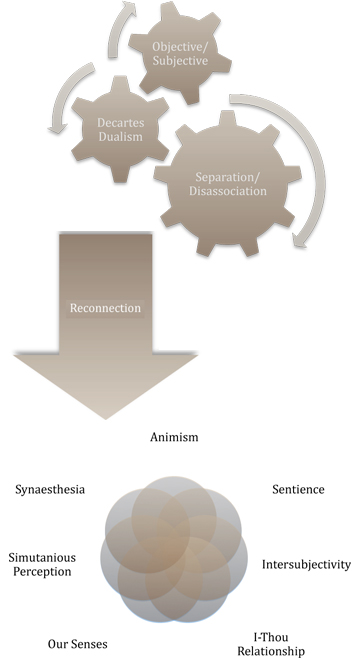Ecopsychology: An Introduction
 Ecopsychology is the study of the human psyche’s relationship and connection to its environment. Mary Gnomes, leader in the field of ecopsychology defines it as, “a movement that aims for cultural transformation of our relationships with our environment.” This field is as old as humans are, and indigenous cultures throughout the world have long been aware of the human/environment connection and relationship, however it is only recently that Western thought has established an academic field in this subject. “Ecopsychology is an effort to salvage the ‘more intimate bond between the ego and the world about it’” (Rosak, 1995, p. 12). Culturally, we have become disconnected from our inner natures and the outer nature. We now seam to move through this world with greater and greater isolation from the planet. Our technology, cultural practices, and training all increase the distance. We have a “permissible repression of cosmic empathy, a psychic numbing we have labeled as ‘normal’” (Rosak, 1995, p. 11). James Hillman poignantly asks in reference to America, “where else in the world would a human soul be so divorced from its surroundings?” (Hillman, 1995, p. xxii)
Ecopsychology is the study of the human psyche’s relationship and connection to its environment. Mary Gnomes, leader in the field of ecopsychology defines it as, “a movement that aims for cultural transformation of our relationships with our environment.” This field is as old as humans are, and indigenous cultures throughout the world have long been aware of the human/environment connection and relationship, however it is only recently that Western thought has established an academic field in this subject. “Ecopsychology is an effort to salvage the ‘more intimate bond between the ego and the world about it’” (Rosak, 1995, p. 12). Culturally, we have become disconnected from our inner natures and the outer nature. We now seam to move through this world with greater and greater isolation from the planet. Our technology, cultural practices, and training all increase the distance. We have a “permissible repression of cosmic empathy, a psychic numbing we have labeled as ‘normal’” (Rosak, 1995, p. 11). James Hillman poignantly asks in reference to America, “where else in the world would a human soul be so divorced from its surroundings?” (Hillman, 1995, p. xxii)
Ecopsychology makes space for the truth that the environment we live within, and the interaction and bond that we feel with it, is an important factor in our and the planets health. In many traditions of shamanism, health is “defined as a balanced relationship with your habitat, your ecosystem” (Gray, 1995, p. 181). Similarly, psychology is now demonstrating that “alterations in the ‘external’ world may be as therapeutic as alternations in subjective feelings” (Hillman, 1995, p. xx). Even more so, it is our relationship- how we perceive, engage and interact with our surroundings- that can alter our experience of life and alter the state of this planet in a beneficial way.
In today’s modern society, many people are lost in the fast-paced striving for success, family, and abundant survival. Alongtheir journey they often loose, or never had, a sense of connection with their own heart and the earth. This experience of connection and bonding to place on land, with community, and in our hearts is a needed medicine for the current state of dissatisfaction in our culture. The elements of nature, presence, unity of matter and spirit, home, community, play, and simplicity can combine to form deep re-bonding between humans and the earth. Ecopsychology is the study of this reconnection to the earth, and to our selves. It honors and cultivates this bond that humans can have with the earth, themselves, and with the sacred.
Ecopsychology has been in practice for thousands of years, but it is only in the past ten years that the field has academically and professionally emerged. It is a highly needed field of education that is growing in the United States. Currently in the United States there are only a few accredited Masters offered in Ecopsychology, one is Naropa University, other schools offer concentration in ecopsychology, such as Antioch University, JFK University and California Institute of Integral Studies. Applied Ecotherapy can include, but is not limited to Animal-assisted therapy, equine therapy, wilderness therapy, expressive arts therapy, garden therapy, somatic therapy, green therapy, and cultural therapy. My work and this website I hope will help to expand awareness of the field and encourage the practice of ecopsychology in a variety of settings.
